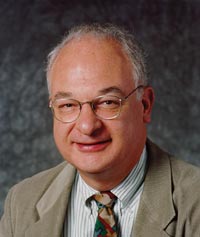|
By Lois Browne
The authority to accredit
teacher education programs, which was granted to the College in December
2002, did not come without a lot of hard work and effort on the part of
the College, the faculties of education and other stakeholders, says College
Registrar Joe Atkinson.
"A number of faculty of education deans played a major role in helping
us develop a process that could be incorporated into a regulation,"
says Atkinson. "Their co-operation was essential in helping us develop
a workable, effective accreditation process."
Regulation 347/02, Accreditation of Teacher Education Programs came into
effect December 12, 2002. The regulation allows the College to launch
the next cycle of reviews of current teacher education programs and begin
initial accreditation of new teacher education programs. The College now
also has the authority to accredit the more than 200 Additional Qualification
(AQ) courses and programs that thousands of Ontario teachers take every
year to enhance their expertise.
 |
|
"The
regulation is an improvement over the framework we were in."
- Allen Pearson
|
Soon after it was
established in 1996, the College struck agreements with the Ontario Association
of Deans of Education (OADE) and the Ontario faculties of education to
launch a three-year pilot project to design an accreditation process.
Accreditation panels comprised of College members at large, university
nominees and Council members conducted a review of each teacher education
program and made recommendations for improvement.
Dual Purpose
The pilot project
had a dual purpose, says Cecilia Reynolds of the Dean's Office in the
Ontario Institute for Studies in Education of the University of Toronto
(OISE/UT) who helped organize the pilot project-both to develop and to
implement. "That's always an onerous process," says Reynolds.
"It's one thing to develop policy but it's a whole other thing to
implement it and get it running smoothly."
"The regulation is an improvement over the framework we were in,"
says Allen Pearson, dean of the faculty of education at the University
of Western Ontario (UWO). "The greatest strength of the accreditation
process is simply in terms of public accountability. It's our peers, both
academically and professionally, evaluating the program and being able
to report to the public and potential students that the program meetsstandards
set by the College."
Pearson says that the process had benefits for the faculty members at
UWO who had an opportunity to work together to reflect on the process
and the teacher education program. "There was a bit of a sense of
a renewal for the faculty to go through the process,"he says.
The value of having a pilot process can be seen in the kinds of changes
that were made to the first draft of the regulation.
Concerns Reflected
Michael Manley-Casimir,
dean of the faculty of education at Brock University, chaired the group
of faculty of education deans that provided feedback on the regulation.
He says that a number of the deans' concerns are reflected in the final
version of the regulation.
The deans suggested changes to the appeal mechanism in cases where accreditation
is not fully granted, said Manley-Casimir. "Personally I'm pleased
with that. The regulation also incorporates our concerns that panel decisions
be evidence-based. The panel should have to provide facts on which their
judgements are based so that a faculty that does not receive accreditation
has some basis for responding."
 |
|
"accreditation...
a safeguard to the teacher candidates and to the general public"
- Cecelia Reynolds
|
Brock's own accreditation
experience, says Manley-Casimir, took a lot of preparation. But, he adds,
"I think it was of real benefit to the faculty."
"The College's standards of practice, which guided the accreditation
process, and our own internal documents about the nature of a teacher
and what characteristics one would expect an educated teacher to have,
were quite compatible. So in some sense the process confirmed for us that
we were doing a reasonably good job in preparing teachers. There were
some things we needed to improve and I think that advice was useful. Generally
it was a useful exercise."
Good Timing
All three university
deans agree that the regulation comes at an opportune time. The provincial
government is expanding the number and kinds of organizations that may
offer pre-service and in-service teacher education programs.
"Bringing new institutions on board without some external scrutiny
would be problematic for the teacher candidate," says Reynolds. "The
University of Toronto's program is a very old program so there are a lot
of both internal and external elements that speak to the quality for a
candidate who wants to come here. But if someone is considering a new
program, how are they going to know the quality is there without a tried
and true program?"
"The fact that these programs have been scrutinized by this external
accreditation body is a benefit to the new institutions and it's a safeguard
to the teacher candidates and to the general public because it means the
teachers coming out of these new programs will be up to the standards
that have been set by the College."
A copy of the final report of the pilot project is available on the Ontario
College of Teachers web site at www.oct.ca 4 Professional Affairs 4
Accreditation 4 A Final Report-Initial Accreditation Reviews-1997-2000.
A copy of the Accreditation Regulation 347/02, Accreditation of Teacher
Education Programs and other education-related legislation can also be
accessed through the College web site.
|
![]()